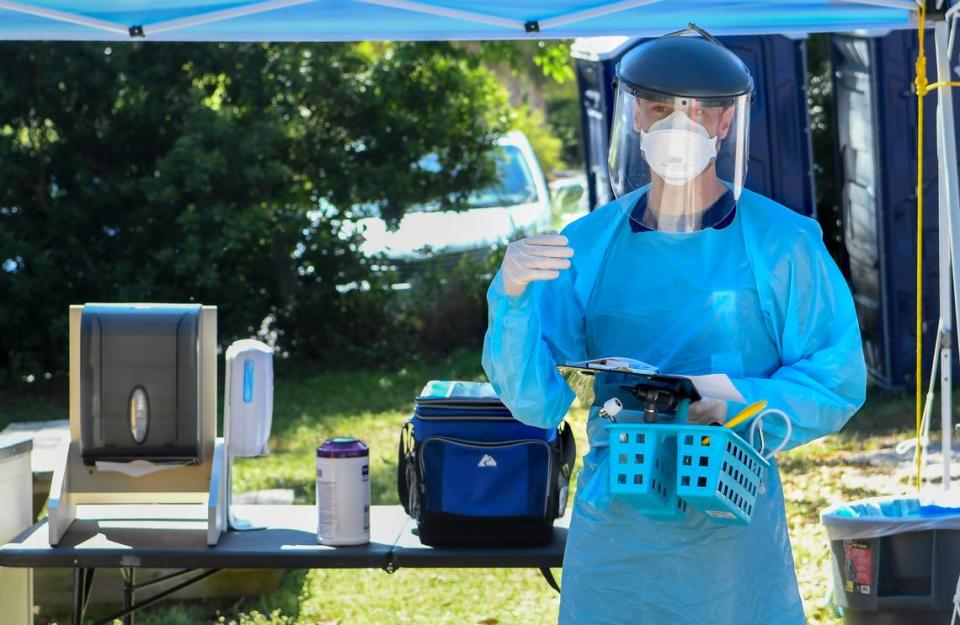If you have these symptoms, you might be infected with omicron, Beaufort Co. doctor says
A sore throat is alarming these days. A runny nose is, too. The symptoms have been identified nationally as possible signs of an omicron infection.
But as COVID-19 cases surge in Beaufort County, what ailments are health care providers actually noticing among the deluge of residents that are now testing positive?
Dr. Faith Polkey, interim chief medical officer at Beaufort Jasper Hampton Comprehensive Health Services, said many patients have a runny nose, a sore throat, a cough or nasal congestion (or a combination of those symptoms).
Omicron, Polkey said, seems to infect cells in the upper respiratory system more easily than those in the lungs.
It’s almost like “they have a little cold,” Polkey said of patients. “I think that’s the deceptive part, the scary part.
“People have definitely talked about more mucus production. It’s kind of the postnasal drip. ‘I got a little sore throat.’ It makes you think that your allergies are acting up.”
Polkey added that some patients are exhibiting gastrointestinal issues, such as vomiting. And night sweats seem to be a new indicator of the coronavirus.
“A lot of the adults are telling me that they’re getting these night sweats, and then fever and chills,” Polkey said.
Fewer patients, though, are now losing their sense of taste and smell, Polkey said. And their coughing is not “deep pneumonia” coughing. It’s more cold-like, she said.
Carlye Gilbert, the infection preventionist at Hilton Head Regional Healthcare, shared Polkey’s observations.
“It’s a sore throat, and sinus pressure. Then it becomes weakness, even altered mental status, where people are just profoundly weak and they’re not acting like themselves,” Gilbert said.
Residents, she said, are not presenting with COVID-19 pneumonia.
Russell Baxley, CEO of Beaufort Memorial Hospital, added that most of omicron’s symptoms seem to mirror those caused by previous coronavirus variants, but anecdotally, the pathogen now appears to stay “mostly in the upper respiratory tract. It doesn’t seem to affect the lungs as much.”
“I think that’s why we’re not seeing the severe cases that we saw with delta,” Baxley said.
Despite the recent surge of omicron infections, Baxley said the hospital has recorded only a slight uptick in the number of COVID-19 inpatients admitted to the medical center for care. (The hospital, as of early Tuesday, was treating 15 coronavirus inpatients. One of those people was in the intensive care unit, Baxley said.)
A team of Hong Kong researchers recently found that omicron replicated about 70 times faster in tissue from the bronchial tubes — which carry air into the lungs — than delta and the original SARS-CoV-2 coronavirus.
Omicron, though, also replicated more than 10 times slower in lung tissue than the original SARS-CoV-2, “which may suggest lower severity of disease,” the team reported.
“I hope that, just as quickly as it came, it will dissipate that quickly,” Polkey said of the super contagious omicron, which was discovered in South Africa late last year.
“My hope is that in February things will look a lot different — that we’ll be through this surge.”
What should you do if you feel sick?
The Centers for Disease Control and Prevention says that if people have coronavirus symptoms they should:
Get tested for COVID-19.
Stay at home, except to seek medical care.
Rest, stay hydrated and take over-the-counter medicines, such as acetaminophen.
Stay in touch with a doctor.
Avoid public transportation, taxis and ride-sharing services.
Stay away from household members.
Wear a mask around others.
Monitor symptoms and look for emergency warning signs such as trouble breathing, persistent pain or pressure in the chest, new confusion, an inability to wake or stay awake and pale, gray or blue-colored skin, lips and nail beds.


